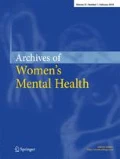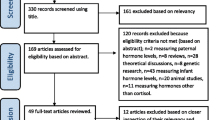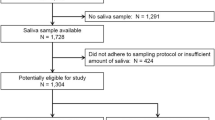Abstract
Timing of cortisol collection during pregnancy is an important factor within studies reporting on the association between maternal cortisol and depression during pregnancy. Our objective was to further examine the extent to which reported associations differed across studies according to time of maternal cortisol collection during pregnancy. On December 15, 2016, records were identified using PubMed/MEDLINE (National Library of Medicine), EMBASE (Elsevier; 1974–), Cumulative Index to Nursing and Allied Health Literature (CINAHL, EBSCO), PsycINFO (EBSCO), and Web of Science Core Collection (Thomson Reuters). Unique abstracts were screened using the following inclusion criteria: (1) maternal cortisol assessed during pregnancy; (2) antepartum depression assessed during pregnancy using a screening instrument; (3) reports on the association between maternal cortisol and antepartum depression; (4) provides information on timing of cortisol assessment during pregnancy, including time of day and gestation; and (5) not a review article or a case study. One thousand three hundred seventy-five records were identified, resulting in 826 unique abstracts. Twenty-nine articles met all inclusion criteria. On balance, most studies reported no association between maternal cortisol and antepartum depression (N = 17), and saliva and blood were the most common reported matrices. Morning and second and third trimesters were the most common times of collection during pregnancy. Among studies reporting an association (N = 12), second-trimester and third-trimester cortisol assessments more consistently reported an association and elevated cortisol concentrations were observed in expected recovery periods. Our review adds to the existing literature on the topic, highlighting gaps and strategic next steps.

Similar content being viewed by others
References
Agbedia OO, Varma VR, Seplaki CL, Seeman TE, Fried LP, Li L, Harris GC, Rebok GW, Xue QL, Tan EJ, Tanner E, Parisi JM, Mcgill S, Carlson MC (2011) Blunted diurnal decline of cortisol among older adults with low socioeconomic status. Ann N Y Acad Sci 1231:56–64
Ballard PL, Ballard RA (1972) Glucocorticoid receptors and the role of glucocorticoids in fetal lung development. Proc Natl Acad Sci U S A 69:2668–2672
Barker ED, Kirkham N, Ng J, Jensen SK (2013) Prenatal maternal depression symptoms and nutrition, and child cognitive function. Br J Psychiatry 203:417–421
Barrios YV, Gelaye B, Zhong Q, Nicolaidis C, Rondon MB, Garcia PJ, Sanchez PA, Sanchez SE, Williams MA (2015) Association of childhood physical and sexual abuse with intimate partner violence, poor general health and depressive symptoms among pregnant women. PLoS One 10:e0116609
Bjelanovic V, Babic D, Hodzic D, Bjelanovic A, Kresic T, Dugandzic-Simic A, Oreskovic S (2015) Correlation of psychological symptoms with cortisol and CRP levels in pregnant women with metabolic syndrome. Psychiatr Danub 27(Suppl 2):578–585
Bolten MI, Wurmser H, Buske-Kirschbaum A, Papousek M, Pirke KM, Hellhammer D (2011) Cortisol levels in pregnancy as a psychobiological predictor for birth weight. Arch Womens Ment Health 14:33–41
Braithwaite, E. C., Murphy, S. E. & Ramchandani, P. G. (2016) Effects of prenatal depressive symptoms on maternal and infant cortisol reactivity. Arch Womens Ment Health
Brummelte S, Galea LA (2010) Depression during pregnancy and postpartum: contribution of stress and ovarian hormones. Prog Neuro-Psychopharmacol Biol Psychiatry 34:766–776
Brunton PJ, Russell JA, Douglas AJ (2008) Adaptive responses of the maternal hypothalamic-pituitary-adrenal axis during pregnancy and lactation. J Neuroendocrinol 20:764–776
Burke CW, Roulet F (1970) Increased exposure of tissues to cortisol in late pregnancy. Br Med J 1:657–659
Burke HM, Davis MC, Otte C, Mohr DC (2005) Depression and cortisol responses to psychological stress: a meta-analysis. Psychoneuroendocrinology 30:846–856
Davis EP, Glynn LM, Schetter CD, Hobel C, Chicz-Demet A, Sandman CA (2007) Prenatal exposure to maternal depression and cortisol influences infant temperament. J Am Acad Child Adolesc Psychiatry 46:737–746
Deligiannidis KM, Kroll-Desrosiers AR, Barton BA, Rothschild AJ (2013) Salivary cortisol response to trier social stress test in healthy third trimester pregnant women and third trimester pregnant women at elevated risk of developing postpartum depression. Neuropsychopharmacology 38:S408–S409
Deligiannidis, K. M., Kroll-Desrosiers, A. R., Svenson, A., Jaitly, N., Barton, B. A., Hall, J. E. & Rothschild, A. J. 2016. Cortisol response to the trier social stress test in pregnant women at risk for postpartum depression. Arch Womens Ment Health
Dettenborn L, Tietze A, Kirschbaum C, Stalder T (2012) The assessment of cortisol in human hair: associations with sociodemographic variables and potential confounders. Stress 15:578–588
Diego MA, Field T, Hernandez-Reif M, Schanberg S, Kuhn C, Gonzalez-Quintero VH (2009) Prenatal depression restricts fetal growth. Early Hum Dev 85:65–70
Dietz PM, Williams SB, Callaghan WM, Bachman DJ, Whitlock EP, Hornbrook MC (2007) Clinically identified maternal depression before, during, and after pregnancies ending in live births. Am J Psychiatry 164:1515–1520
Evans LM, Myers MM, Monk C (2008) Pregnant women’s cortisol is elevated with anxiety and depression—but only when comorbid. Arch Womens Ment Health 11:239–248
Field T, Diego M, Hernandez-Reif M, Deeds O, Holder V, Schanberg S, Kuhn C (2009) Depressed pregnant black women have a greater incidence of prematurity and low birthweight outcomes. Infant Behav Dev 32:10–16
Gavin NI, Gaynes BN, Lohr KN, Meltzer-Brody S, Gartlehner G, Swinson T (2005) Perinatal depression: a systematic review of prevalence and incidence. Obstet Gynecol 106:1071–1083
Gelaye B, Rondon MB, Araya R, Williams MA (2016) Epidemiology of maternal depression, risk factors, and child outcomes in low-income and middle-income countries. Lancet Psychiatry 3:973–982
Gelman PL, Flores-Ramos M, Lopez-Martinez M, Fuentes CC, Grajeda JP (2015) Hypothalamic-pituitary-adrenal axis function during perinatal depression. Neurosci Bull 31:338–350
Glover V, Kammerer M (2004) The biology and pathophysiology of peripartum psychiatric disorders. Primary Psychiatry 11:37–41
Glynn LM, Sandman CA (2014) Evaluation of the association between placental corticotrophin-releasing hormone and postpartum depressive symptoms. Psychosom Med 76:355–362
Goedhart G, Vrijkotte TGM, Roseboom TJ, van der Wal MF, Cuijpers P, Bonsel GJ (2010) Maternal cortisol and offspring birthweight: results from a large prospective cohort study. Psychoneuroendocrinology 35:644–652
Grote NK, Bridge JA, Gavin AR, Melville JL, Iyengar S, Katon WJ (2010) A meta-analysis of depression during pregnancy and the risk of preterm birth, low birth weight, and intrauterine growth restriction. Arch Gen Psychiatry 67:1012–1024
Hellgren C, Akerud H, Skalkidou A, Sundstrom-Poromaa I (2013) Cortisol awakening response in late pregnancy in women with previous or ongoing depression. Psychoneuroendocrinology 38:3150–3154
Hoffman MC, Mazzoni SE, Wagner BD, Laudenslager ML, Ross RG (2016) Measures of maternal stress and mood in relation to preterm birth. Obstet Gynecol 127:545–552
Hoffman S, Hatch MC (2000) Depressive symptomatology during pregnancy: evidence for an association with decreased fetal growth in pregnancies of lower social class women. Health Psychol 19:535–543
Horrigan TJ, Schroeder AV, SchaffeR RM (2000) The triad of substance abuse, violence, and depression are interrelated in pregnancy. J Subst Abus Treat 18:55–58
Iliadis SI, Comasco E, Sylven S, Hellgren C, Sundstrom Poromaa I, Skalkidou A (2015) Prenatal and postpartum evening salivary cortisol levels in association with peripartum depressive symptoms. PLoS One 10:e0135471
Kaasen A, Helbig A, Malt UF, Godang K, Bollerslev J, Naes T, Haugen G (2012) The relation of psychological distress to salivary and serum cortisol levels in pregnant women shortly after the diagnosis of a structural fetal anomaly. Acta Obstet Gynecol Scand 91:68–78
Katz ER, Stowe ZN, Newport DJ, Kelley ME, Pace TW, Cubells JF, Binder EB (2012) Regulation of mRNA expression encoding chaperone and co-chaperone proteins of the glucocorticoid receptor in peripheral blood: association with depressive symptoms during pregnancy. Psychol Med 42:943–956
Kino T (2015) Stress, glucocorticoid hormones, and hippocampal neural progenitor cells: implications to mood disorders. Front Physiol 6:230
Kirschbaum C, Tietze A, Skoluda N, Dettenborn L (2009) Hair as a retrospective calendar of cortisol production-increased cortisol incorporation into hair in the third trimester of pregnancy. Psychoneuroendocrinology 34:32–37
Knorr U, Vinberg M, Kessing LV, Wetterslev J (2010) Salivary cortisol in depressed patients versus control persons: a systematic review and meta-analysis. Psychoneuroendocrinology 35:1275–1286
Kurki T, Hiilesmaa V, Raitasalo R, Mattila H, Ylikorkala O (2000) Depression and anxiety in early pregnancy and risk for preeclampsia. Obstet Gynecol 95:487–490
Lachelin GC 2013. Introduction to clinical reproduction endocrinology
Lara MA, Le HN, Letechipia G, Hochhausen L (2009) Prenatal depression in Latinas in the U.S. and Mexico. Matern Child Health J 13:567–576
Lommatzsch M, Hornych K, Zingler C, Schuff-Werner P, Hoppner J, Virchow JC (2006) Maternal serum concentrations of BDNF and depression in the perinatal period. Psychoneuroendocrinology 31:388–394
Luiza JW, Gallaher MJ, Powers RW (2015) Urinary cortisol and depression in early pregnancy: role of adiposity and race. BMC Pregnancy Childbirth 15:30
Meliska CJ, Martinez LF, Lopez AM, Sorenson DL, Nowakowski S, Kripke DF, Elliott J, Parry BL (2013) Antepartum depression severity is increased during seasonally longer nights: relationship to melatonin and cortisol timing and quantity. Chronobiol Int 30:1160–1173
Monk C, Fifer WP, Myers MM, Bagiella E, Duong JK, Chen IS, Leotti L, Altincatal A (2011) Effects of maternal breathing rate, psychiatric status, and cortisol on fetal heart rate. Dev Psychobiol 53:221–233
Murphy SE, Braithwaite EC, Hubbard I, Williams KV, Tindall E, Holmes EA, Ramchandani PG (2015) Salivary cortisol response to infant distress in pregnant women with depressive symptoms. Arch Womens Ment Health 18:247–253
O’connor TG, Tang W, Gilchrist MA, Moynihan JA, Pressman EK, Blackmore ER (2014) Diurnal cortisol patterns and psychiatric symptoms in pregnancy: short-term longitudinal study. Biol Psychol 96:35–41
O’keane V, Lightman S, Marsh M, Pawlby S, Papadopoulos AS, Taylor A, Moore R, Patrick K (2011) Increased pituitary-adrenal activation and shortened gestation in a sample of depressed pregnant women: a pilot study. J Affect Disord 130:300–305
Orr ST, James SA, Blackmore Prince C (2002) Maternal prenatal depressive symptoms and spontaneous preterm births among African-American women in Baltimore, Maryland. Am J Epidemiol 156:797–802
Parcells DA (2010) Women’s mental health nursing: depression, anxiety and stress during pregnancy. J Psychiatr Ment Health Nurs 17:813–820
Pariante CM (2014) Depression during pregnancy: molecular regulations of mothers’ and children’s behaviour. Biochem Soc Trans 42:582–586
Pariante CM, Lightman SL (2008) The HPA axis in major depression: classical theories and new developments. Trends Neurosci 31:464–468
Pedersen CA, Stern RA, Pate J, Senger MA, Bowes WA, Mason GA (1993) Thyroid and adrenal measures during late pregnancy and the puerperium in women who have been major depressed or who become dysphoric postpartum. J Affect Disord 29:201–211
Peer M, Soares CN, Levitan RD, Streiner DL, Steiner M (2013) Antenatal depression in a multi-ethnic, community sample of Canadian immigrants: psychosocial correlates and hypothalamic-pituitary-adrenal axis function. Can J Psychiatr 58:579–587
Penninx BW, Milaneschi Y, Lamers F, Vogelzangs N (2013) Understanding the somatic consequences of depression: biological mechanisms and the role of depression symptom profile. BMC Med 11:129
Pluess M, Bolten M, Pirke KM, Hellhammer D (2010) Maternal trait anxiety, emotional distress, and salivary cortisol in pregnancy. Biol Psychol 83:169–175
Rahman A, Iqbal Z, Bunn J, Lovel H, Harrington R (2004) Impact of maternal depression on infant nutritional status and illness: a cohort study. Arch Gen Psychiatry 61:946–952
Rouse MH, Goodman SH (2014) Perinatal depression influences on infant negative affectivity: timing, severity, and co-morbid anxiety. Infant Behav Dev 37:739–751
Russell E, Koren G, Rieder M, Van Uum S (2012) Hair cortisol as a biological marker of chronic stress: current status, future directions and unanswered questions. Psychoneuroendocrinology 37:589–601
Salacz P, Csukly G, Haller J, Valent S (2012) Association between subjective feelings of distress, plasma cortisol, anxiety, and depression in pregnant women. Eur J Obstet Gynecol Reprod Biol 165:225–230
Sandman CA, Glynn L, Schetter CD, Wadhwa P, Garite T, Chicz-Demet A, Hobel C (2006) Elevated maternal cortisol early in pregnancy predicts third trimester levels of placental corticotropin releasing hormone (CRH): priming the placental clock. Peptides 27:1457–1463
Schatz DB, Hsiao MC, Liu CY (2012) Antenatal depression in East Asia: a review of the literature. Psychiatry Investig 9:111–118
Serati M, Redaelli M, Buoli M, Altamura AC (2016) Perinatal major depression biomarkers: a systematic review. J Affect Disord 193:391–404
Seth S, Lewis AJ, Galbally M (2016) Perinatal maternal depression and cortisol function in pregnancy and the postpartum period: a systematic literature review. BMC Pregnancy Childbirth 16:124
Shaikh K, Premji SS, Rose MS, Kazi A, Khowaja S, Tough S (2011) The association between parity, infant gender, higher level of paternal education and preterm birth in Pakistan: a cohort study. BMC Pregnancy Childbirth 11:88
Shea AK, Streiner DL, Fleming A, Kamath MV, Broad K, Steiner M (2007) The effect of depression, anxiety and early life trauma on the cortisol awakening response during pregnancy: preliminary results. Psychoneuroendocrinology 32:1013–1020
Shidhaye P, Giri P (2014) Maternal depression: a hidden burden in developing countries. Ann Med Health Sci Res 4:463–465
Stawski RS, Cichy KE, Piazza JR, Almeida DM (2013) Associations among daily stressors and salivary cortisol: findings from the National Study of Daily Experiences. Psychoneuroendocrinology 38:2654–2665
Stetler C, Miller GE (2011) Depression and hypothalamic-pituitary-adrenal activation: a quantitative summary of four decades of research. Psychosom Med 73:114–126
Susman EJ, Schmeelk KH, Worrall BK, Granger DA, Ponirakis A, Chrousos GP (1999) Corticotropin-releasing hormone and cortisol: longitudinal associations with depression and antisocial behavior in pregnant adolescents. J Am Acad Child Adolesc Psychiatry 38:460–467
Voegtline KM, Costigan KA, Kivlighan KT, Laudenslager ML, Henderson JL, Dipietro JA (2013) Concurrent levels of maternal salivary cortisol are unrelated to self-reported psychological measures in low-risk pregnant women. Arch Womens Ment Health 16:101–108
Vreeburg SA, Hoogendijk WJ, Van Pelt J, Derijk RH, Verhagen JC, Van Dyck R, Smit JH, Zitman FG, Penninx BW (2009) Major depressive disorder and hypothalamic-pituitary-adrenal axis activity: results from a large cohort study. Arch Gen Psychiatry 66:617–626
Wikenius E, Moe V, Kjellevold M, Smith L, Lyle R, Waagbo R, Page CM, Myhre AM (2016) The association between hair cortisol and self-reported symptoms of depression in pregnant women. PloS One 11:e0161804
Workman JL, Barha CK, Galea LAM (2012) Endocrine substrates of cognitive and affective changes during pregnancy and postpartum. Behav Neurosci 126:54–72
Wosu AC, ValdimarsdÓttir U, Shields AE, Williams DR, Williams MA (2013) Correlates of cortisol in human hair: implications for epidemiologic studies on health effects of chronic stress. Ann Epidemiol 23:797–811
Funding
The National Institute of Health Training Grant in Psychiatric Epidemiology (T32-MH-017119) and the Eunice Kennedy Shriver Institute of Child Health and Human Development (R01-HD-059835) supported this research. Neither funding source had any further role in the study design, data collection and analysis, data interpretation, manuscript writing, or decision to submit the paper for publication.
Author information
Authors and Affiliations
Corresponding author
Ethics declarations
Conflict of interest
The authors declare that they have no conflict of interest.
Electronic supplementary material
ESM 1
(DOCX 18 kb)
Rights and permissions
About this article
Cite this article
Orta, O.R., Gelaye, B., Bain, P.A. et al. The association between maternal cortisol and depression during pregnancy, a systematic review. Arch Womens Ment Health 21, 43–53 (2018). https://doi.org/10.1007/s00737-017-0777-y
Received:
Accepted:
Published:
Issue Date:
DOI: https://doi.org/10.1007/s00737-017-0777-y




